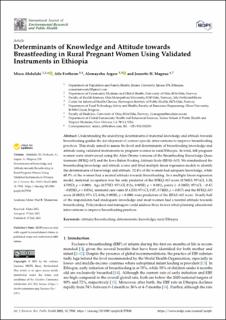| dc.contributor.author | Ahmed, Misra Abdulahi | |
| dc.contributor.author | Fretheim, Atle | |
| dc.contributor.author | Argaw, Alemayehu | |
| dc.contributor.author | Magnus, Jeanette H. | |
| dc.coverage.spatial | Ethiopia | en_US |
| dc.date.accessioned | 2022-03-02T14:00:58Z | |
| dc.date.available | 2022-03-02T14:00:58Z | |
| dc.date.created | 2021-08-17T10:05:34Z | |
| dc.date.issued | 2021-07-27 | |
| dc.identifier.citation | International Journal of Environmental Research and Public Health (IJERPH). 2021, 18 (15), . | en_US |
| dc.identifier.issn | 1660-4601 | |
| dc.identifier.uri | https://hdl.handle.net/11250/2982573 | |
| dc.description.abstract | Understanding the underlying determinants of maternal knowledge and attitude towards breastfeeding guides the development of context-specific interventions to improve breastfeeding practices. This study aimed to assess the level and determinants of breastfeeding knowledge and attitude using validated instruments in pregnant women in rural Ethiopia. In total, 468 pregnant women were interviewed using the Afan Oromo versions of the Breastfeeding Knowledge Questionnaire (BFKQ-AO) and the Iowa Infant Feeding Attitude Scale (IIFAS-AO). We standardized the breastfeeding knowledge and attitude scores and fitted multiple linear regression models to identify the determinants of knowledge and attitude. 52.4% of the women had adequate knowledge, while 60.9% of the women had a neutral attitude towards breastfeeding. In a multiple linear regression model, maternal occupation was the only predictor of the BFKQ-AO score (0.56SD; 95%CI, 1.28, 4.59SD; p = 0.009). Age (0.57SD; 95%CI, 0.24, 0.90SD; p = 0.001), parity (−0.24SD; 95%CI, −0.47, −0.02SD; p = 0.034), antenatal care visits (0.41SD; 95%CI, 0.07, 0.74SD; p = 0.017) and the BFKQ-AO score (0.08SD; 95% CI, 0.06, 0.09SD; p < 0.000) were predictors of the IIFAS-AO score. Nearly half of the respondents had inadequate knowledge and most women had a neutral attitude towards breastfeeding. Policymakers and managers could address these factors when planning educational interventions to improve breastfeeding practices. | en_US |
| dc.description.sponsorship | This research was funded by Norad (Norwegian Agency for Development Cooperation) under the NORHED-Program, Agreement no. ETH-13/0024. | en_US |
| dc.language.iso | eng | en_US |
| dc.publisher | MDPI | en_US |
| dc.relation.ispartofseries | International Journal of Environmental Research and Public Health (IJERPH);Volume 18 / Issue 15 | |
| dc.rights | Navngivelse 4.0 Internasjonal | * |
| dc.rights.uri | http://creativecommons.org/licenses/by/4.0/deed.no | * |
| dc.subject | Attitudes | en_US |
| dc.subject | Breastfeeding | en_US |
| dc.subject | Determinants | en_US |
| dc.subject | Knowledge | en_US |
| dc.subject | Rural Ethiopia | en_US |
| dc.title | Determinants of knowledge and attitude towards breastfeeding in rural pregnant women using validated instruments in Ethiopia | en_US |
| dc.type | Peer reviewed | en_US |
| dc.type | Journal article | en_US |
| dc.description.version | publishedVersion | en_US |
| dc.rights.holder | © 2021 by the authors | en_US |
| dc.source.articlenumber | 7930 | en_US |
| cristin.ispublished | true | |
| cristin.fulltext | original | |
| cristin.qualitycode | 1 | |
| dc.identifier.doi | https://doi.org/10.3390/ijerph18157930 | |
| dc.identifier.cristin | 1926541 | |
| dc.source.journal | International Journal of Environmental Research and Public Health (IJERPH) | en_US |
| dc.source.volume | 18 | en_US |
| dc.source.issue | 15 | en_US |
| dc.source.pagenumber | 11 | en_US |
| dc.relation.project | NORAD, direktoratet for utviklingssamarbeid: ETH-13/0024 | en_US |

